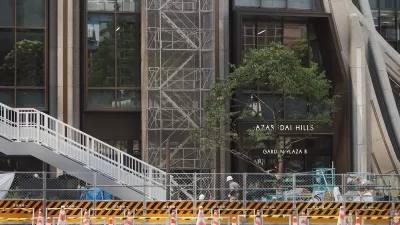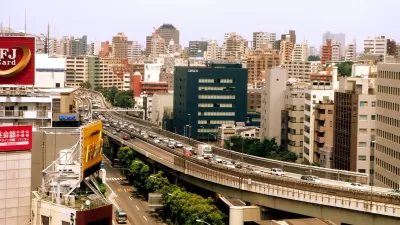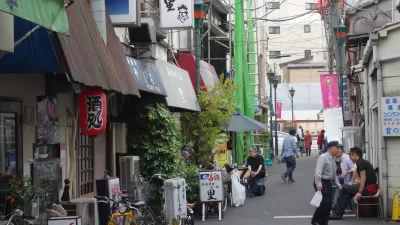ASLA's blog, The Dirt, dishes on how sushi, an ancient food, became modern in Tokyo, and conquered the world.
What we, in the West, consider sushi was invented in Tokyo in the beginning of the 19th century. The Dirt provides the story, as told by professor Jordan Sand, Georgetown University, at the recent Food & The City symposium at Dumbarton Oaks in Washington, D.C.:
"With the need for "fast food," usually eaten on the run by Samurai and
their short-term mates out on the town, new variations of sushi came
into being. To fit the need, "restauranteurs first made street food
fancy and then they made it fast," said Sand. By the 1820s, these early
innovators stopped the pickling process and Nigirizushi (or sushi as we
know it in the West) became a "hit" among the Samurai and
commoners alike. What made sushi interesting, and perhaps transgressive,
was that it combined elite foods of the Samurai and street foods of the
common classes, creating a new form."
The story doesn't end there. Read on for more about the food's impact on the built and natural environments.
FULL STORY: How Tokyo Invented Sushi

Alabama: Trump Terminates Settlements for Black Communities Harmed By Raw Sewage
Trump deemed the landmark civil rights agreement “illegal DEI and environmental justice policy.”

Planetizen Federal Action Tracker
A weekly monitor of how Trump’s orders and actions are impacting planners and planning in America.

The 120 Year Old Tiny Home Villages That Sheltered San Francisco’s Earthquake Refugees
More than a century ago, San Francisco mobilized to house thousands of residents displaced by the 1906 earthquake. Could their strategy offer a model for the present?

In Both Crashes and Crime, Public Transportation is Far Safer than Driving
Contrary to popular assumptions, public transportation has far lower crash and crime rates than automobile travel. For safer communities, improve and encourage transit travel.

Report: Zoning Reforms Should Complement Nashville’s Ambitious Transit Plan
Without reform, restrictive zoning codes will limit the impact of the city’s planned transit expansion and could exclude some of the residents who depend on transit the most.

Judge Orders Release of Frozen IRA, IIJA Funding
The decision is a victory for environmental groups who charged that freezing funds for critical infrastructure and disaster response programs caused “real and irreparable harm” to communities.
Urban Design for Planners 1: Software Tools
This six-course series explores essential urban design concepts using open source software and equips planners with the tools they need to participate fully in the urban design process.
Planning for Universal Design
Learn the tools for implementing Universal Design in planning regulations.
Clanton & Associates, Inc.
Jessamine County Fiscal Court
Institute for Housing and Urban Development Studies (IHS)
City of Grandview
Harvard GSD Executive Education
Toledo-Lucas County Plan Commissions
Salt Lake City
NYU Wagner Graduate School of Public Service





























